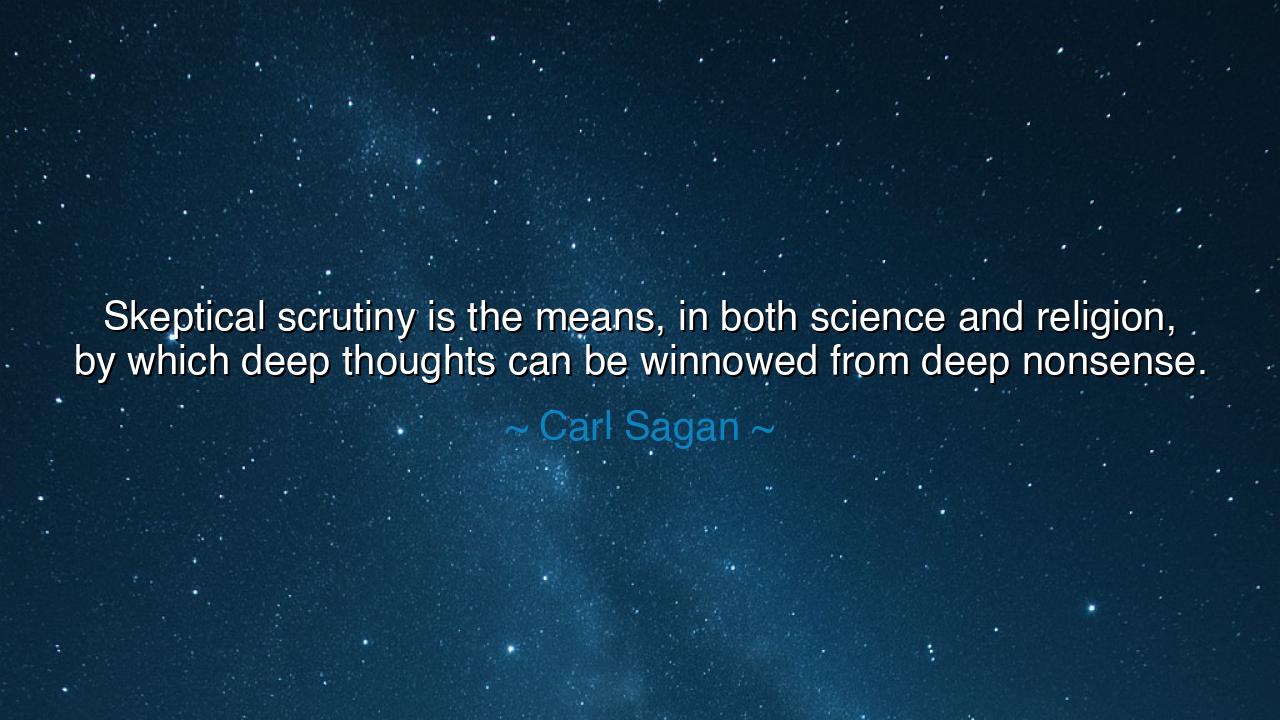
Skeptical scrutiny is the means, in both science and religion, by
Skeptical scrutiny is the means, in both science and religion, by which deep thoughts can be winnowed from deep nonsense.






“Skeptical scrutiny is the means, in both science and religion, by which deep thoughts can be winnowed from deep nonsense.” — thus spoke Carl Sagan, the stargazer and sage of the modern age, whose voice carried both the poetry of wonder and the precision of reason. In this declaration, Sagan reveals a truth as timeless as the cosmos itself: that faith without questioning becomes blind, and reason without humility becomes arrogant. He reminds us that both science and religion — those twin pursuits of truth — must submit to the discipline of skeptical scrutiny, the testing fire by which genuine wisdom is separated from illusion. Like a farmer winnowing the grain from the chaff, the human mind must sift its own beliefs to discover what is real, enduring, and true.
The origin of this quote lies in Sagan’s lifelong quest to reconcile awe with inquiry. He was a man who loved the universe deeply — not merely as a scientist studying its mechanisms, but as a philosopher beholding its mystery. He saw that both science and religion sprang from the same sacred root: the desire to understand existence. The prophets and the astronomers alike looked to the heavens with wonder — but where one saw gods and angels, the other saw galaxies and laws of nature. Yet both, Sagan believed, could lose their way when they abandoned the practice of questioning. For without skepticism, devotion becomes dogma, and curiosity becomes chaos.
To understand his wisdom, one must see skepticism not as denial, but as reverent inquiry. The skeptic is not the destroyer of belief, but its purifier — the one who dares to test what he loves, so that it may stand strong. When Sagan speaks of “winnowing deep nonsense,” he does not mock the dreamer or the believer; he simply warns that not every “deep” thought is true. Many ideas glitter like gold but are mere dust when touched by reason. The purpose of scrutiny is not to banish wonder, but to guard it from falsehood — for lies, even beautiful ones, corrupt the soul’s vision of the real.
Consider the story of Galileo Galilei, who stood before the might of the Church and declared that the Earth moved around the Sun. In his age, such words were blasphemy. Yet Galileo did not seek rebellion for its own sake — he sought truth through observation, through the quiet labor of skeptical inquiry. He peered through his telescope and saw what others refused to see. His faith was not in institutions, but in reality itself. And though he suffered for it, the world was transformed. His story shows that skepticism, when guided by integrity, is not an enemy of faith — it is faith’s renewal. For to question what we believe is not to destroy it, but to make it worthy of belief.
Sagan’s teaching is not a condemnation of religion, but a call to purify it of superstition. He admired the moral grandeur of faith — its compassion, its sense of purpose, its awe before creation. But he also saw how easily it can be corrupted when men stop asking questions and start enforcing answers. The same is true of science, when pride replaces curiosity. For dogma wears many masks — it can wear a priest’s robe or a lab coat. Thus, Sagan calls us to remember that both realms — the spiritual and the rational — must bow before the same master: truth, not authority.
In this way, his quote becomes not just a defense of reason, but a hymn to intellectual humility. To be skeptical is to admit that we do not know everything, and to seek the light through honest effort. It is to stand, as Sagan himself often said, “between the infinitesimal and the infinite,” aware of how small we are, yet capable of understanding the universe. True skepticism does not extinguish wonder — it deepens it. For when one removes illusion, what remains is more astonishing than any fantasy: reality itself, vast and sacred.
Therefore, my children, let this be your lesson: question boldly, but with love. Test every claim, even those that comfort you. Do not fear doubt — it is the beginning of wisdom. Whether in matters of faith or science, seek the evidence, listen to reason, and be willing to change your mind when truth demands it. Remember that certainty is not strength, but stagnation; that wisdom grows only where humility lives. The stars themselves invite us to inquire — not to worship blindly, but to understand deeply.
So, walk the path that Sagan walked: gaze upward with wonder, and inward with courage. Let skepticism be your compass, and curiosity your fire. For through their union, you will not only discern truth from falsehood, but also rediscover the holiness of understanding itself. Then, as Sagan promised, the universe will open to you — not as a cold machine, but as a living mystery, worthy of both your science and your reverence.






AAdministratorAdministrator
Welcome, honored guests. Please leave a comment, we will respond soon